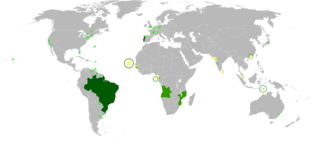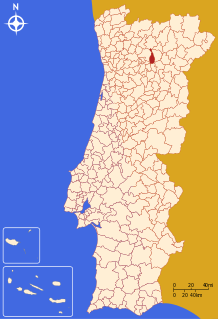Viscount of Vilarinho de São Romão (Portuguese : Visconde de Vilarinaho de São Romão) is a title created by Queen Maria II of Portugal, by decree dated 17 September 1835, in favour of António Lobo Barbosa Teixeira Ferreira Girão (Sabrosa, Vilarinho de São Romão, 5 November 1785 - Lisbon, 17 March 1863], Member of the House of Lords, without descendents.

Portuguese is a Western Romance language originating in the Iberian Peninsula. It is the sole official language of Portugal, Brazil, Cape Verde, Guinea-Bissau, Mozambique, Angola, and São Tomé and Príncipe. It also has co-official language status in East Timor, Equatorial Guinea and Macau in China. As the result of expansion during colonial times, a cultural presence of Portuguese and Portuguese creole speakers are also found in Goa, Daman and Diu in India; in Batticaloa on the east coast of Sri Lanka; in the Indonesian island of Flores; in the Malacca state of Malaysia; and the ABC islands in the Caribbean where Papiamento is spoken, while Cape Verdean Creole is the most widely spoken Portuguese-based Creole. Reintegrationists maintain that Galician is not a separate language, but a dialect of Portuguese. A Portuguese-speaking person or nation is referred to as "Lusophone" (Lusófono).

DonaMaria II "the Educator" or "the Good Mother", reigned as Queen of Portugal from 1826 to 1828, and again from 1834 to 1853. Born in Rio de Janeiro, she was the first child of Emperor Pedro I of Brazil and his first wife, Empress Maria Leopoldina and thus a member of the House of Braganza. One of the two surviving children born when Pedro was still heir apparent to Portugal, she inherited Portuguese titles and was placed in the line of succession to the former Portuguese throne, even after becoming a member of the Brazilian Imperial Family, from which she was excluded in 1835 after her definitive ascension to the Portuguese throne.

Sabrosa is a municipality in the district of Vila Real in northern Portugal. The population in 2011 was 6,361, in an area of 156.92 km².
The Girão family is directly descended from Manuel Girão, son of a Spanish noble, António Girão (or Giron), belonging to the House of the Dukes of Osuna, who, in the early 16th century lived in Montemor-o-Velho, Portugal and who was also the father of Amador Girão (his eldest son), married D. Maria Freire de Andrade from the House of Corujeira, Vouzela (Portugal) from whom the Girão branch of Beira Alta (Portugal) follows.

Duke of Osuna is a Spanish noble title that was first awarded in 1562 by King Philip II of Spain to Pedro Girón de la Cueva,. Pedro was also Viceroy of Naples, (1582–1586), Ambassador in Portugal and 5th Count of Ureña.




